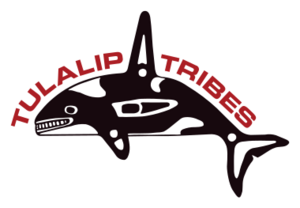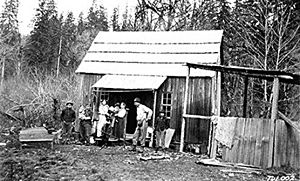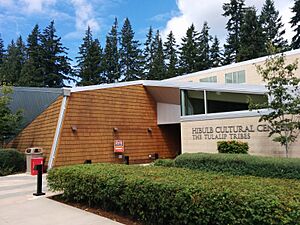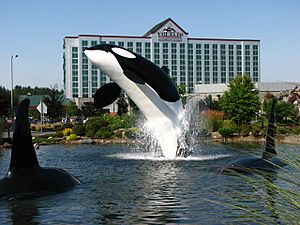Tulalip Tribes facts for kids

Logo of the Tulalip Tribes
|
|
| Total population | |
|---|---|
| 2,500–2,800 enrolled members | |
| Regions with significant populations | |
| Languages | |
| English, Lushootseed | |
| Religion | |
| Traditional tribal religion | |
| Related ethnic groups | |
| other Duwamish, Snohomish, Snoqualmie, Skagit, Sauk-Suiattle, Samish, and Stillaguamish people |
The Tulalip Tribes of Washington are a group of Native American people. They are officially recognized by the United States government as a "federally recognized tribe." This means they have their own government and land. The Tulalip Tribes are made up of several smaller groups. These include the Duwamish, Snohomish, Snoqualmie, Skagit, Suiattle, Samish, and Stillaguamish people.
These tribes are part of the larger Coast Salish peoples. They are Native Americans who have lived along the Pacific Northwest Coast for thousands of years. The Tulalip Tribes live in the middle Puget Sound area of Washington State.
A famous Tulalip leader named John McCoy worked in the Washington State government. He was a member of the state legislature from 2003 to 2020. The Tulalip Tribes also work with other tribes. They use their combined voice to help protect tribal interests in the state.
Contents
What Does "Tulalip" Mean?
The name Tulalip comes from the Snohomish language. The original word is Lushootseed: dxʷlilap. In 1855, this name was used for the tribes who came together. They settled on the Tulalip Reservation. This reservation was created by a special agreement with the U.S. government. The tribes included the Duwamish, Snohomish, Snoqualmie, Skagit, Suiattle, Samish, and Stillaguamish peoples. All of these groups are part of the Coast Salish people.
The Tulalip Reservation

The Tulalip Indian Reservation is the homeland of the Tulalip Tribes. It was set up by the Treaty of Point Elliot in 1855. Later, U.S. President Ulysses S. Grant made it official in 1873. The reservation is located on Port Susan in western Snohomish County. It is next to the city of Marysville. The reservation covers about 35.3 square miles (91.4 square kilometers). In 2000, about 9,246 people lived there. The biggest community on the reservation is Tulalip Bay.
The Tulalip people moved to the reservation lands after signing the Point Elliott Treaty. This treaty was signed with the Washington Territory on January 22, 1855. Today, the reservation makes up the western part of the Marysville–Tulalip area. Interstate 5 was built in the 1950s and 1960s. This highway divided the community. Marysville is a city located east of the highway.
The Marysville School District serves both Marysville and the reservation. In 2008, new schools were built on the reservation. This large campus is now called the Marysville Secondary Campus. It includes Heritage High School and Marysville Arts and Technology High School. These schools share a gym and a common area. In 2022, the Tulalip Tribes announced plans for their own elementary school. This school would focus on Native American culture and education.
Tulalip Economy and Businesses
The Tulalip Tribes have worked hard to create jobs and income for their people. They built Quil Ceda Village on the reservation. This village has a business park. The business park includes the tribe's first casino, Quil Ceda Creek Casino. They also built a larger casino, the Tulalip Resort Casino, with a luxury hotel.
Many retail stores are also located here, like Walmart and Home Depot. In 2004, the tribe partnered with a company to build an outlet mall. This mall, called Seattle Premium Outlet, opened in 2005. It has many stores and restaurants. This partnership brings in money for the tribe for many years.
In 2011, the tribe opened the Hibulb Cultural Center and Natural History Preserve. This center is 23,000 square feet (2,100 square meters). It has museum exhibits about Tulalip history and artifacts. It also has classrooms, a research library, and a traditional longhouse. There is also a 50-acre (20-hectare) nature preserve next to it.
The Tulalip Tribes also own and run other businesses. These include Tulalip Bingo, various restaurants, and two gas stations. They have invested in many different businesses to make their economy strong.
Communities on the Reservation
- Cathan
- John Sam Lake
- Priest Point
- Quil Ceda Village
- Shaker Church
- Stimson Crossing
- Tulalip Bay
- Weallup Lake
Tribal Justice System
Native American tribal courts have their own laws and ways of handling justice. For a long time, tribal courts could not handle criminal cases involving people who were not Native American. However, a new law was passed in 2013. It is called the Violence Against Women Reauthorization Act of 2013 (VAWA 2013). This law allows tribal courts to handle certain crimes related to domestic and dating violence, even if the person accused is not Native American.
This new law started for most tribes in 2015. But a special "Pilot Project" allowed some tribes to start earlier. The Tulalip Tribes of Washington were one of three tribes chosen for this project. This helped them protect their community members from violence.
Language and Culture
The Tulalip Tribes speak English. They also speak Lushootseed, which is a Central Salish language. Lushootseed is written using the same alphabet as English. Books like dictionaries and grammar guides have been created for the language.
In the 1990s, the tribe started its own language department. Their goal is to teach and keep the Lushootseed language alive. They want more people in the region to use it. In 2019, Marysville Pilchuck High School even started offering Lushootseed classes to its students. This helps young people learn their traditional language.
Community Events
The Tulalip Tribes hold many special events each year.
- Treaty Days: This event usually happens in January. It remembers the signing of the Point Elliot Treaty on January 22, 1855.
- First King Salmon Ceremony: This ceremony blesses the fishermen. It celebrates catching the first king salmon of the season. Salmon is very important to the Coast Salish people.
- Winter Dancing: These are traditional dances held during the winter months.
- Veteran's Pow Wow: This event honors Native American veterans. It takes place during the first weekend of June.
See also
 In Spanish: Tulalip para niños
In Spanish: Tulalip para niños



